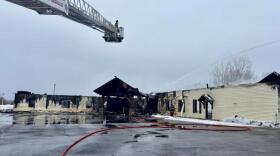The Red Cross is putting out a call to arms to past and potential blood donors, as the organization faces a nationwide shortage.
Billy Brill works for the Red Cross, spreading the word about the crucial need for blood donations. He donated for the first time more than a decade ago when a friend’s wife had a medical crisis. He said it’s a way to have a real impact on people in need.
"When you donate blood, and it's used to improve or save a life, that's such a direct connection," he said.
But now, Brill said a spike in summer travel and a busy back-to-school season have led to a dip in donations. Then, Hurricane Idalia forced community blood drives to cancel, while the need for resources climbed.
Brill said now, the Red Cross is keeping a close eye on how the path of Hurricane Lee may affect the blood supply in areas not too far away from the storm damage, like central New York.
"Blood drives that are going on in our communities help ensure that the inventory stays up to par, so that we can help those around us and meet the needs of the patients in our region as well," he said.
The Red Cross said there is an urgent need for all types of donors, but there is an emergency need for platelet donations or donors with Type O blood.
If you’ve been turned away at blood drives before, you may be eligible now. Brill said, that in 2019, about 35 percent of adults were eligible to donate, but that number has increased.
"With our advances in screening and health assessment and with the help of the FDA updating their requirements, it's now up to 65 percent of the general public that can donate," he said.
To find out if you’re able to donate, call 1-800-RED-CROSS.
If you’re not eligible, there are still ways to help. Brill said anyone can encourage a friend or family member to donate, or share details about an upcoming blood drive.
To find out about scheduled blood drives in your area, visit redcrossblood.org and enter your zip code.








